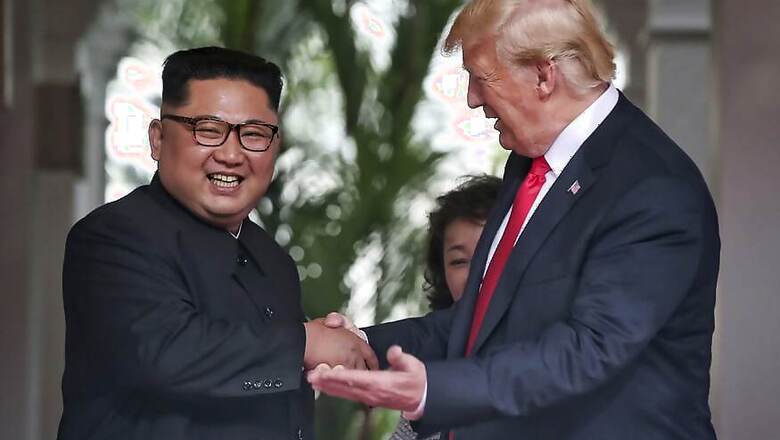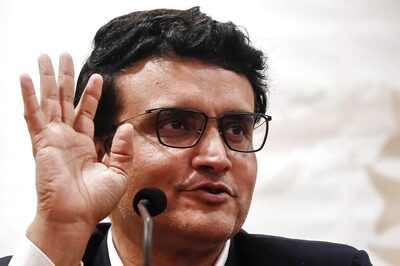
views
United Nations: US President Donald Trump said Monday he expects to hold a second summit soon with Kim Jong Un, lauding the North Korean strongman at the United Nations as "terrific" one year after he eviscerated him from the same platform.
Trump used his debut address to the UN General Assembly 12 months ago to threaten to "totally destroy" North Korea and belittled its leader as "rocket man," prompting Kim to respond by calling the US president "mentally deranged."
But returning to New York for this year's gathering, Trump hailed "tremendous progress" to halt Pyongyang's nuclear and ballistic missile tests and said that a year later it was a "much different time."
"Chairman Kim has been really very open and terrific, frankly, and I think he wants to see something happen," Trump said after meeting South Korean President Moon Jae-in, a dove who recently visited Kim in Pyongyang.
"I think within a fairly short period of time that (summit) will be announced. It will be at a location to be determined but we're both very much looking forward to having it."
Trump, who met Kim in Singapore in June in the first-ever summit between the two countries that have never signed a peace treaty, earlier told reporters that he appreciated "a beautiful letter" the young North Korean leader had sent to him.
While relations with Kim have improved dramatically, leaders attending the annual assembly expect this year to hear Trump espouse a hard line on a different US adversary, Iran's Hassan Rouhani.
US Secretary of State Mike Pompeo — who has visited Pyongyang three times — will preside over a Security Council meeting Thursday to explain the administration's imposition of sanctions on North Korea, which has hit Chinese and Russian companies.
Skepticism remains about whether Kim has taken any concrete steps, but that seems unlikely to deter Trump from pushing toward a new summit in what he considers a key foreign policy achievement.
Focus on sovereignty
In his 41-minute speech at the General Assembly in 2017, Trump made clear he wanted to turn the clock back on the last half-century's growth of global rules and institutions and to return to the primacy of the nation-state.
His national security adviser, John Bolton, said that Trump would stress defense of US sovereignty in his latest UN address on Tuesday.
The UN's number one financial backer, the United States has moved under Trump to cut funding to the world body, notably to peacekeeping missions that are key to the UN's goal of promoting peace and security.
"The United Nations has tremendous potential and that potential is being met, slowly but surely," Trump told a meeting on combatting drugs attended by UN chief Antonio Guterres.
Pressure on Iran
While Trump will dial down the rhetoric against Kim, there seems to be little prospect of him doing likewise with Rouhani.
The United States annoyed many of its allies in Europe by pulling out of a deal they jointly negotiated in 2015 that lifted sanctions against Tehran in exchange for restrictions on its nuclear program.
US allies in the Middle East, notably Saudi Arabia, have, however, been delighted by Trump's stance.
Bolton said the United States was seeking to ramp up pressure on Iran but not to overthrow the regime -- an idea he supported before taking his job and reiterated recently by former New York mayor Rudy Giuliani, who is Trump's personal lawyer.
"As I have said repeatedly, regime change in Iran is not the administration's policy," Bolton told reporters.
"We've imposed very stringent sanctions on Iran, more are coming, and what we expect from Iran is massive changes in their behavior," he said.
On Wednesday, Trump will for the first time chair a Security Council meeting on non-proliferation that will focus heavily on Iran, likely triggering a clash with other big powers.
The White House has not closed the door on a Rouhani-Trump meeting. But Rouhani, in an interview with NBC News after arriving in New York, saw such an offer as hypocritical.
"Naturally, if someone is keen on having a meeting and holding dialogue and creating progress in relationships, that person would not use the tool of sanctions and threats (and bring) to bear all of its power against another government and nation," Rouhani said.
Iranian supreme leader Ayatollah Ali Khamenei on Monday accused US allies Saudi Arabia and the United Arab Emirates of supporting Arab separatists allegedly behind an attack on a military parade last week that killed 24 people.



















Comments
0 comment